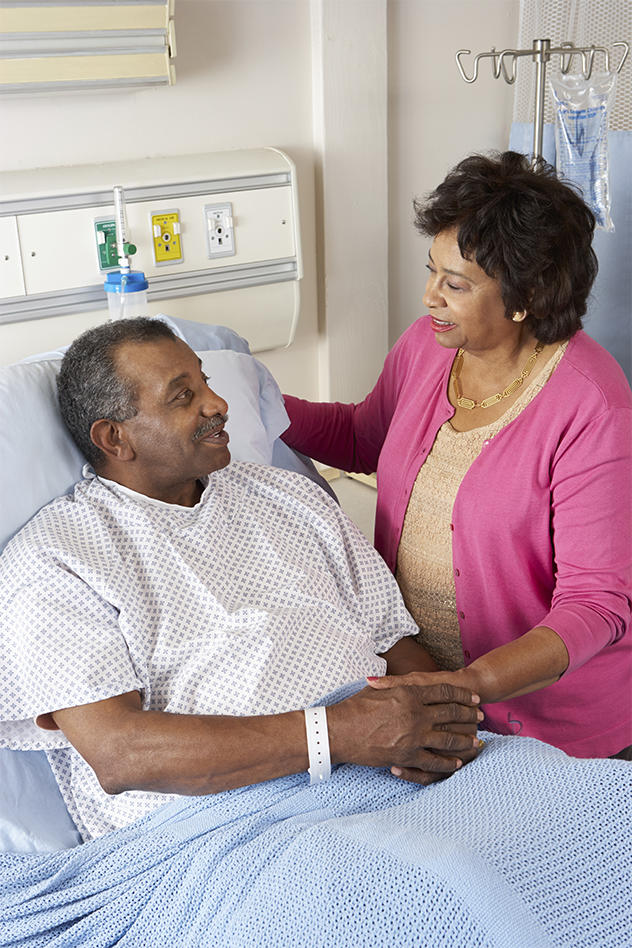Your Feelings
With a terminal cancer diagnosis, the shifts in care and new decisions that need to be made often come with many emotions, such as sadness, anger, and the fear of the unknown. It's important to share your feelings with someone you trust, such as friend, family member, or trained counselor.
Denial
You may have trouble accepting that your friend or family member may not recover. You may think that if she keeps getting treatment, something may finally work, or that a new discovery will be made. There's nothing wrong with being hopeful.
Try to listen to your loved one and the doctor to really hear what they're saying. Denying the facts about the cancer may make the patient feel that you don't really understand what's happening. Again, it's okay to deal with things at your own pace. But be aware of the effect this may have on others.
Guilt
Feeling guilty is a common reaction for caregivers. You may worry that you’re not doing enough, not saying the right things, or that work and other things are getting in the way. You may even feel guilty that you’re healthy or for not acting upbeat and cheerful. But know that it’s normal to have these feelings and you shouldn’t hide them. Try to:
- Let go of mistakes. You can’t be perfect. The best we can do is learn from our mistakes and move on.
- Focus on the things that are worth your time and energy. Let other things go for now.
- Forgive yourself and others. Chances are good that you’re doing what you can. Each day brings a chance to try again.
- Talk to someone. If you find guilt overwhelming, seek help from a social worker or licensed professional counselor.
Anger
Being tired and stressed can put you on edge more than usual. And because of this, your feelings may get hurt more easily or you may get angry more often. There are many reasons for this such as:
- feeling overwhelmed
- wishing you had more help
- feeling like people don’t understand how much you’re going through.
It’s easy to get angry more quickly with others than you normally would. If you can, try to ask yourself what's causing the anger. Are you tired? Frustrated with medical care? Does your loved one seem demanding? Take time to process your feelings. It may also help you to express anger through exercise, art, or even hitting the bed with a pillow.
At the same time, sometimes the person you’re caring for directs anger at you. They may feel stressed, tired, or scared, and in turn, take their feelings out on you. Or sometimes medicine causes people to have more anger than they normally would.
Try not to take anger from your loved one personally. Ask the doctor if anger is a side effect of medicine. It may also be helpful to share your feelings with your loved one. Sometimes people don’t realize the effect that their anger has on others. And try to remember that we often show our feelings, good or bad, to the people we love the most.
Grief
Grief is the process of letting go and accepting and learning to live with loss. Part of the grieving process is feeling extreme sadness. You may feel sad about the losses you've experienced and the life you used to have.
You may begin to feel the loss of your loved one even before he or she dies. This is called anticipatory grief. It's normal to feel sad about the changes you are going through and the losses you are going to have. Common causes of grief include:
- You may have expected your life with your friend or family member to be different than what you’re faced with right now.
- You may be feeling sad over the unknowns in the future.
- You may be grieving the future loss of your loved one and all the changes involved.
Everyone is different in how they grieve and in what they grieve for. Let yourself grieve in your own way and time. For example some people:
- Don't show as much emotion as others when they grieve. They may cry less than you would expect.
- Withdraw and keep to themselves. Even if they're in public, they may be less talkative than usual.
- Try to stay busy. They show their feelings by doing things, rather than talking about them.
- Show their anger more often. They may seem more short-tempered than you're used to them being.
Understand that these feelings of grief are normal. And grief can come up at times when you're not expecting it. Although it can come and go in intensity, grief can last for many months and will vary in intensity. If you feel the need, seek help from hospice staff, a mental health expert, or a support group as you go through the grieving process.
See Coping with Your Feelings During Advanced Cancer for other feelings caregivers and patients may have during cancer care and ways to deal with them.
Ask for Help from Others
You may be faced with new challenges and concerns now that your loved one has advanced cancer. If the illness has been going on for a long time, these challenges may wear you down even more.
Many caregivers say that, looking back, they took on too much. They wish they had asked for help sooner in sharing tasks or seeking support. Many people probably want to help but don't know what you need or whether you want help. And as the cancer progresses, you may see changes in the support you get from others. For example:
- People who have helped before may not help now.
- Others who have helped before may want to help in new ways.
- People who haven't helped before may start helping.
- Agencies that couldn't help before may offer services now.
Accepting help from others isn't always easy. When tough things happen, some people think they can handle it on their own. Others pull back from their regular social life and people in general. Asking for help seems like work.
But things can get harder as your loved one’s cancer progresses. As a result, many caregivers have said they feel stretched to the point that they can't do it anymore. As simple as it sounds, it's good to remind others that you still need help.
Use respite care
Many caregivers say that they wish they had gotten respite care sooner. Some say they waited our of pride or guilt. Others just didn't think about it earlier. Respite providers spend time with your loved one so you can rest, see friends, run errands, or do whatever you'd like to do.
If respite care sounds useful, you may want to talk with your loved one about having someone help out from time to time. Ask your health care team for suggestions on how to find respite care in your area. You can also get respite help from family and friends.
Remember that getting help for yourself can also help your loved one as well as other friends and family. For more tips, see Support for Caregivers of Cancer Patients.
How to Manage Visitors
You may have many more people calling you or coming by to visit than ever before. Many caregivers say they feel very blessed when people show they care. But even though you might be very thankful for their love and support, there may be times when you need some space.
Some things you can do if you need time to yourself or just with your family are:
- Let your voicemail pick up the messages.
- Ask a family member or friend (or both) to be a point of contact for people wanting information.
- Put a sign on the door of your home or hospital room thanking people for coming by and letting them know your loved one is resting. Leave room for a note if they want to write one.
- Have a friend in your home handle visitors while you can be in another part of your home taking care of your own needs.
- Set up a website to keep people up to date and let them leave messages. Examples can be found at Caring Bridge or Lotsa Helping Hands.
- Go to a place where you can’t be reached for a while.

